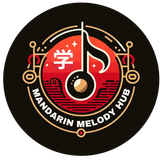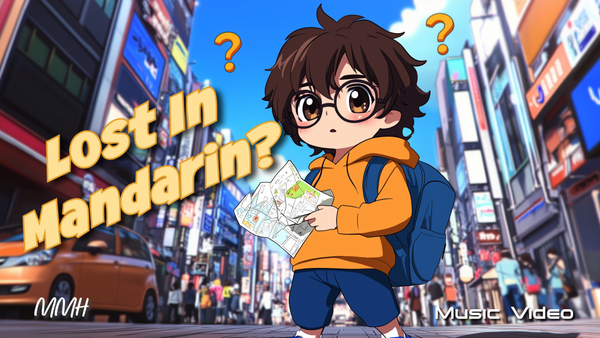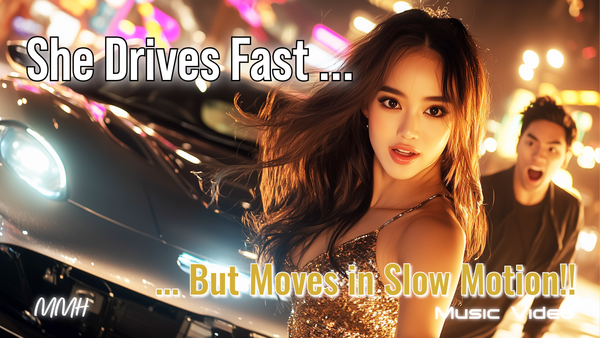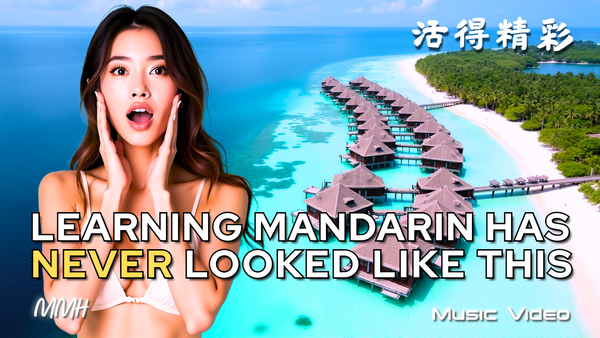Turning Boredom Into Adventure: Nothing To Do Vocabulary
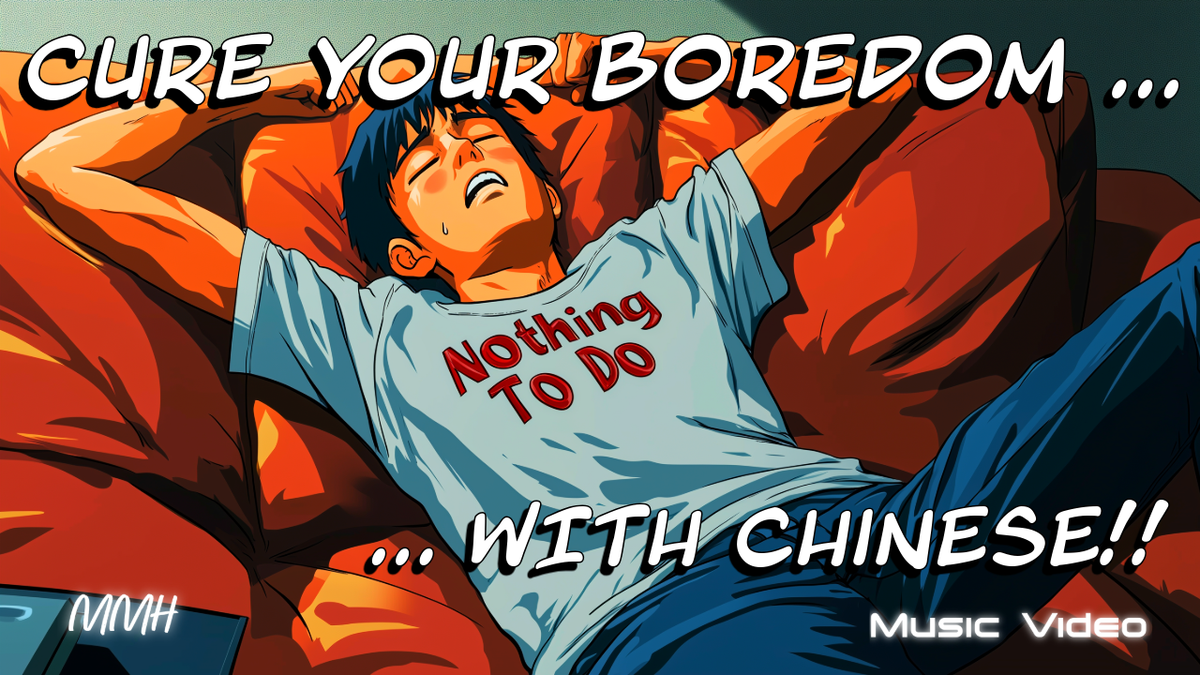
Transform idle moments into opportunities for creativity and self-discovery
Originally released October 10, 2024
🎵 Watch & Listen
🎮 Practice with Interactive Flashcards
Master all the hobby and activity vocabulary from 'Nothing To Do' with our interactive flashcards! From sports and creative pursuits to leisure activities, you'll learn how to express all your interests in Chinese.
→ Practice "Nothing To Do" Flashcards
The Story Behind the Song
We've all been there – staring at the ceiling, scrolling through our phones, wondering what to do with ourselves. "Nothing To Do" captures that universal feeling of restlessness and transforms it into something beautiful: a journey of self-discovery through activities and hobbies.
This retro indie pop anthem follows a relatable protagonist who starts with the simple confession "我真的没有事做" (I really have nothing to do) and "我能做些什么呢?" (What can I do?). But rather than wallowing in boredom, the song becomes an exploration of possibilities. From outdoor adventures like running and cycling to creative pursuits like drawing and writing, from sports like basketball and soccer to quiet pleasures like listening to music and reading books, the lyrics paint a vibrant picture of how we can fill our free time meaningfully.
What makes this song particularly powerful for language learners is how it presents vocabulary in the context of real decision-making. Instead of just memorizing isolated words for hobbies, you're experiencing them as actual choices – the way you would naturally encounter them in daily life. The bilingual approach seamlessly weaves Chinese and English together, making the learning process feel organic and conversational. By the end of the song, that initial boredom has transformed into excitement about all the possibilities life offers, teaching us that sometimes the best adventures begin with having "nothing to do."
Complete Song Lyrics
Chorus
{我|wǒ - I}{真的|zhēn de - really}{没有|méi yǒu - don't have}{事|shì - things}{做|zuò - to do} ({wǒ|我 - I} {zhēn de|真的 - really} {méi yǒu|没有 - don't have} {shì|事 - things} {zuò|做 - to do})
I really have nothing to do
I really have nothing to do
{我|wǒ - I}{能|néng - can}{做|zuò - do}{些|xiē - some}{什么|shén me - what}{呢|ne - question particle}? ({wǒ|我 - I} {néng|能 - can} {zuò|做 - do} {xiē|些 - some} {shén me|什么 - what} {ne|呢 - question particle})
What can I do?
I'm looking for something new
Verse 1
Maybe I'll go outside, breathe the morning air.
{我|wǒ - I}{可以|kě yǐ - can}{去|qù - go}{跑步|pǎo bù - run},{放松|fàng sōng - relax}{一下|yī xià - a bit}{心情|xīn qíng - mood} ({wǒ|我 - I} {kě yǐ|可以 - can} {qù|去 - go} {pǎo bù|跑步 - run} {fàng sōng|放松 - relax} {yī xià|一下 - a bit} {xīn qíng|心情 - mood})
I can go running, relax my mood a bit
Or maybe take a nice long walk somewhere.
{爬山|pá shān - climb mountain}{或者|huò zhě - or}{骑|qí - ride}{自行车|zì xíng chē - bicycle}{都|dōu - all}{不错|bù cuò - not bad} ({pá shān|爬山 - climb mountain} {huò zhě|或者 - or} {qí|骑 - ride} {zì xíng chē|自行车 - bicycle} {dōu|都 - all} {bù cuò|不错 - not bad})
Climbing mountains or riding bicycles are all good
Chorus
{我|wǒ - I}{真的|zhēn de - really}{没有|méi yǒu - don't have}{事|shì - things}{做|zuò - to do} ({wǒ|我 - I} {zhēn de|真的 - really} {méi yǒu|没有 - don't have} {shì|事 - things} {zuò|做 - to do})
I really have nothing to do
I really have nothing to do
{我|wǒ - I}{能|néng - can}{做|zuò - do}{些|xiē - some}{什么|shén me - what}{呢|ne - question particle}? ({wǒ|我 - I} {néng|能 - can} {zuò|做 - do} {xiē|些 - some} {shén me|什么 - what} {ne|呢 - question particle})
What can I do?
I'm looking for something new
Verse 2
I could put on some music, find a perfect song.
{我|wǒ - I}{可以|kě yǐ - can}{听|tīng - listen}{音乐|yīn yuè - music},{旋律|xuán lǜ - melody}{让|ràng - let}{我|wǒ - me}{放松|fàng sōng - relax} ({wǒ|我 - I} {kě yǐ|可以 - can} {tīng|听 - listen} {yīn yuè|音乐 - music} {xuán lǜ|旋律 - melody} {ràng|让 - let} {wǒ|我 - me} {fàng sōng|放松 - relax})
I can listen to music, the melody lets me relax
Or maybe read a book, escape into a story.
{看|kàn - watch}{个|gè - classifier}{电影|diàn yǐng - movie},{或是|huò shì - or}{看|kàn - read}{本|běn - classifier}{好|hǎo - good}{书|shū - book}{让|ràng - let}{我|wǒ - me}{开心|kāi xīn - happy} ({kàn|看 - watch} {gè|个 - classifier} {diàn yǐng|电影 - movie} {huò shì|或是 - or} {kàn|看 - read} {běn|本 - classifier} {hǎo|好 - good} {shū|书 - book} {ràng|让 - let} {wǒ|我 - me} {kāi xīn|开心 - happy})
Watch a movie, or read a good book to make me happy
Chorus
{我|wǒ - I}{真的|zhēn de - really}{没有|méi yǒu - don't have}{事|shì - things}{做|zuò - to do} ({wǒ|我 - I} {zhēn de|真的 - really} {méi yǒu|没有 - don't have} {shì|事 - things} {zuò|做 - to do})
I really have nothing to do
I really have nothing to do
{我|wǒ - I}{能|néng - can}{做|zuò - do}{些|xiē - some}{什么|shén me - what}{呢|ne - question particle}? ({wǒ|我 - I} {néng|能 - can} {zuò|做 - do} {xiē|些 - some} {shén me|什么 - what} {ne|呢 - question particle})
What can I do?
I'm looking for something new
Verse 3
I could grab a pencil, start drawing what I see.
{我|wǒ - I}{可以|kě yǐ - can}{画画|huà huà - draw},{表达|biǎo dá - express}{我的|wǒ de - my}{创意|chuàng yì - creativity} ({wǒ|我 - I} {kě yǐ|可以 - can} {huà huà|画画 - draw} {biǎo dá|表达 - express} {wǒ de|我的 - my} {chuàng yì|创意 - creativity})
I can draw, express my creativity
Or maybe write a song, and sing it loud and free.
{写|xiě - write}{点|diǎn - a bit}{东西|dōng xi - things}{或|huò - or}{唱歌|chàng gē - sing songs},{总|zǒng - always}{让|ràng - let}{我|wǒ - me}{很|hěn - very}{开心|kāi xīn - happy} ({xiě|写 - write} {diǎn|点 - a bit} {dōng xi|东西 - things} {huò|或 - or} {chàng gē|唱歌 - sing songs} {zǒng|总 - always} {ràng|让 - let} {wǒ|我 - me} {hěn|很 - very} {kāi xīn|开心 - happy})
Write some things or sing songs, always makes me very happy
Chorus
{我|wǒ - I}{真的|zhēn de - really}{没有|méi yǒu - don't have}{事|shì - things}{做|zuò - to do} ({wǒ|我 - I} {zhēn de|真的 - really} {méi yǒu|没有 - don't have} {shì|事 - things} {zuò|做 - to do})
I really have nothing to do
I really have nothing to do
{我|wǒ - I}{能|néng - can}{做|zuò - do}{些|xiē - some}{什么|shén me - what}{呢|ne - question particle}? ({wǒ|我 - I} {néng|能 - can} {zuò|做 - do} {xiē|些 - some} {shén me|什么 - what} {ne|呢 - question particle})
What can I do?
I'm looking for something new
Verse 4
Maybe I'll grab a ball and head out for a game.
{我|wǒ - I}{可以|kě yǐ - can}{打|dǎ - play}{篮球|lán qiú - basketball},{动作|dòng zuò - movements}{帅气|shuài qi - cool}{又|yòu - and}{快|kuài - fast} ({wǒ|我 - I} {kě yǐ|可以 - can} {dǎ|打 - play} {lán qiú|篮球 - basketball} {dòng zuò|动作 - movements} {shuài qi|帅气 - cool} {yòu|又 - and} {kuài|快 - fast})
I can play basketball, the movements are cool and fast
Or hit the court for tennis, perfecting my aim.
{踢|tī - kick}{足球|zú qiú - soccer}{或|huò - or}{网球|wǎng qiú - tennis},{我|wǒ - I}{一直|yī zhí - always}{在|zài - am}{进步|jìn bù - progressing} ({tī|踢 - kick} {zú qiú|足球 - soccer} {huò|或 - or} {wǎng qiú|网球 - tennis} {wǒ|我 - I} {yī zhí|一直 - always} {zài|在 - am} {jìn bù|进步 - progressing})
Kick soccer or tennis, I'm always progressing
Chorus
{我|wǒ - I}{真的|zhēn de - really}{没有|méi yǒu - don't have}{事|shì - things}{做|zuò - to do} ({wǒ|我 - I} {zhēn de|真的 - really} {méi yǒu|没有 - don't have} {shì|事 - things} {zuò|做 - to do})
I really have nothing to do
I really have nothing to do
{我|wǒ - I}{能|néng - can}{做|zuò - do}{些|xiē - some}{什么|shén me - what}{呢|ne - question particle}? ({wǒ|我 - I} {néng|能 - can} {zuò|做 - do} {xiē|些 - some} {shén me|什么 - what} {ne|呢 - question particle})
What can I do?
I'm looking for something new
Complete Vocabulary List
Master every Chinese word from this song with our comprehensive vocabulary breakdown, organized by HSK difficulty level for systematic learning.
Basic Vocabulary (HSK 1-2)
- {我|wǒ - I} ({wǒ|我 - I}) = I, me [HSK1]
- {真的|zhēn de - really} ({zhēn|真 - real} {de|的 - particle}) = really [HSK1]
- {没有|méi yǒu - don't have} ({méi|没 - not} {yǒu|有 - have}) = don't have [HSK1]
- {事|shì - things} ({shì|事 - things}) = things, matters [HSK1]
- {做|zuò - do} ({zuò|做 - do}) = to do [HSK1]
- {能|néng - can} ({néng|能 - can}) = can, able to [HSK1]
- {些|xiē - some} ({xiē|些 - some}) = some [HSK1]
- {什么|shén me - what} ({shén|什 - what} {me|么 - particle}) = what [HSK1]
- {呢|ne - particle} ({ne|呢 - particle}) = question particle [HSK1]
- {可以|kě yǐ - can} ({kě|可 - can} {yǐ|以 - use}) = can, may [HSK1]
- {去|qù - go} ({qù|去 - go}) = to go [HSK1]
- {或者|huò zhě - or} ({huò|或 - or} {zhě|者 - suffix}) = or [HSK2]
- {都|dōu - all} ({dōu|都 - all}) = all [HSK1]
- {不错|bù cuò - not bad} ({bù|不 - not} {cuò|错 - wrong}) = not bad [HSK1]
- {听|tīng - listen} ({tīng|听 - listen}) = to listen [HSK1]
- {让|ràng - let} ({ràng|让 - let}) = to let, make [HSK2]
- {看|kàn - watch} ({kàn|看 - watch}) = to watch, look [HSK1]
- {个|gè - classifier} ({gè|个 - classifier}) = classifier [HSK1]
- {或是|huò shì - or} ({huò|或 - or} {shì|是 - is}) = or [HSK2]
- {本|běn - classifier} ({běn|本 - classifier}) = classifier for books [HSK1]
- {我的|wǒ de - my} ({wǒ|我 - my} {de|的 - particle}) = my [HSK1]
- {点|diǎn - some} ({diǎn|点 - point}) = some, a little [HSK1]
- {东西|dōng xi - things} ({dōng|东 - east} {xi|西 - west}) = things [HSK1]
- {或|huò - or} ({huò|或 - or}) = or [HSK2]
- {总|zǒng - always} ({zǒng|总 - always}) = always [HSK2]
- {很|hěn - very} ({hěn|很 - very}) = very [HSK1]
- {打|dǎ - play} ({dǎ|打 - hit}) = to hit, play [HSK1]
- {又|yòu - and} ({yòu|又 - and}) = and, also [HSK1]
- {快|kuài - fast} ({kuài|快 - fast}) = fast [HSK1]
- {一直|yī zhí - always} ({yī|一 - one} {zhí|直 - straight}) = always [HSK2]
- {在|zài - at} ({zài|在 - at}) = at, in [HSK1]
Intermediate Vocabulary (HSK 3-4)
- {跑步|pǎo bù - run} ({pǎo|跑 - run} {bù|步 - step}) = to run [HSK3]
- {放松|fàng sōng - relax} ({fàng|放 - release} {sōng|松 - loose}) = to relax [HSK3]
- {一下|yī xià - a bit} ({yī|一 - one} {xià|下 - down}) = a bit, once [HSK3]
- {心情|xīn qíng - mood} ({xīn|心 - heart} {qíng|情 - feelings}) = mood [HSK3]
- {爬山|pá shān - climb mountain} ({pá|爬 - climb} {shān|山 - mountain}) = mountain climbing [HSK3]
- {骑|qí - ride} ({qí|骑 - ride}) = to ride [HSK3]
- {自行车|zì xíng chē - bicycle} ({zì|自 - self} {xíng|行 - travel} {chē|车 - vehicle}) = bicycle [HSK3]
- {音乐|yīn yuè - music} ({yīn|音 - sound} {yuè|乐 - music}) = music [HSK3]
- {旋律|xuán lǜ - melody} ({xuán|旋 - revolve} {lǜ|律 - rhythm}) = melody [HSK4]
- {电影|diàn yǐng - movie} ({diàn|电 - electricity} {yǐng|影 - shadow}) = movie [HSK3]
- {好书|hǎo shū - good book} ({hǎo|好 - good} {shū|书 - book}) = good book [HSK3]
- {开心|kāi xīn - happy} ({kāi|开 - open} {xīn|心 - heart}) = happy [HSK3]
- {画画|huà huà - draw} ({huà|画 - draw} {huà|画 - draw}) = to draw [HSK3]
- {表达|biǎo dá - express} ({biǎo|表 - express} {dá|达 - reach}) = to express [HSK4]
- {创意|chuàng yì - creativity} ({chuàng|创 - create} {yì|意 - idea}) = creativity [HSK4]
- {写|xiě - write} ({xiě|写 - write}) = to write [HSK3]
- {唱歌|chàng gē - sing} ({chàng|唱 - sing} {gē|歌 - song}) = to sing [HSK3]
- {篮球|lán qiú - basketball} ({lán|篮 - basket} {qiú|球 - ball}) = basketball [HSK3]
- {动作|dòng zuò - movements} ({dòng|动 - move} {zuò|作 - action}) = movements [HSK3]
- {帅气|shuài qì - cool} ({shuài|帅 - handsome} {qì|气 - energy}) = cool, handsome [HSK4]
- {踢|tī - kick} ({tī|踢 - kick}) = to kick [HSK3]
- {足球|zú qiú - soccer} ({zú|足 - foot} {qiú|球 - ball}) = soccer [HSK3]
- {网球|wǎng qiú - tennis} ({wǎng|网 - net} {qiú|球 - ball}) = tennis [HSK3]
- {进步|jìn bù - improving} ({jìn|进 - advance} {bù|步 - step}) = to improve [HSK3]
Advanced/Specialized Vocabulary (HSK 5+ or non-HSK)
This song focuses primarily on basic and intermediate vocabulary related to daily activities and hobbies, with most expressions falling into HSK 1-4 levels to ensure accessibility for language learners.
Line-by-Line Analysis
Understanding the grammar and structure behind every line helps you build strong foundational knowledge for natural Chinese expression.
Chorus
{我|wǒ - I}{真的|zhēn de - really}{没有|méi yǒu - don't have}{事|shì - things}{做|zuò - to do} ({wǒ|我 - I} {zhēn de|真的 - really} {méi yǒu|没有 - don't have} {shì|事 - things} {zuò|做 - to do} - I really have nothing to do)
- Grammar: Subject + Adverb + Negative verb + Object + Infinitive verb
- Key Point: 没有 (méi yǒu) negates possession; 事做 (shì zuò) means "things to do"
- Structure: 我 (wǒ - I) + 真的 (zhēn de - really) + 没有事做 (méi yǒu shì zuò - have nothing to do)
I really have nothing to do
{我|wǒ - I}{能|néng - can}{做|zuò - do}{些|xiē - some}{什么|shén me - what}{呢|ne - question particle}? ({wǒ|我 - I} {néng|能 - can} {zuò|做 - do} {xiē|些 - some} {shén me|什么 - what} {ne|呢 - question particle} - What can I do?)
- Grammar: Subject + Modal verb + Verb + Quantifier + Question word + Particle
- Key Point: 能 (néng) indicates ability; 呢 (ne) softens the question tone
- Structure: 我 (wǒ - I) + 能做些什么 (néng zuò xiē shén me - can do what) + 呢 (ne - particle)
I'm looking for something new
Verse 1
Maybe I'll go outside, breathe the morning air.
{我|wǒ - I}{可以|kě yǐ - can}{去|qù - go}{跑步|pǎo bù - run},{放松|fàng sōng - relax}{一下|yī xià - a bit}{心情|xīn qíng - mood} ({wǒ|我 - I} {kě yǐ|可以 - can} {qù|去 - go} {pǎo bù|跑步 - run} {fàng sōng|放松 - relax} {yī xià|一下 - a bit} {xīn qíng|心情 - mood} - I can go running, relax my mood a bit)
- Grammar: Subject + Modal verb + Directional verb + Activity + Verb + Measure word + Object
- Key Point: 可以 (kě yǐ) indicates permission/possibility; 一下 (yī xià) softens the action
- Structure: 我 (wǒ - I) + 可以去跑步 (kě yǐ qù pǎo bù - can go running) + 放松一下心情 (fàng sōng yī xià xīn qíng - relax mood a bit)
Or maybe take a nice long walk somewhere.
{爬山|pá shān - climb mountain}{或者|huò zhě - or}{骑|qí - ride}{自行车|zì xíng chē - bicycle}{都|dōu - all}{不错|bù cuò - not bad} ({pá shān|爬山 - climb mountain} {huò zhě|或者 - or} {qí|骑 - ride} {zì xíng chē|自行车 - bicycle} {dōu|都 - all} {bù cuò|不错 - not bad} - Climbing mountains or riding bicycles are all not bad)
- Grammar: Activity + Conjunction + Activity + Emphasis marker + Adjective
- Key Point: 或者 (huò zhě) offers alternatives; 都 (dōu) emphasizes "all options"
- Structure: 爬山 (pá shān - climb mountains) + 或者骑自行车 (huò zhě qí zì xíng chē - or ride bicycles) + 都不错 (dōu bù cuò - all are good)
Verse 2
I could put on some music, find a perfect song.
{我|wǒ - I}{可以|kě yǐ - can}{听|tīng - listen}{音乐|yīn yuè - music},{旋律|xuán lǜ - melody}{让|ràng - let}{我|wǒ - me}{放松|fàng sōng - relax} ({wǒ|我 - I} {kě yǐ|可以 - can} {tīng|听 - listen} {yīn yuè|音乐 - music} {xuán lǜ|旋律 - melody} {ràng|让 - let} {wǒ|我 - me} {fàng sōng|放松 - relax} - I can listen to music, the melody lets me relax)
- Grammar: Subject + Modal verb + Verb + Object + Subject + Causative verb + Object + Verb
- Key Point: 让 (ràng) is causative - "makes/lets me relax"; 旋律 (xuán lǜ) is poetic
- Structure: 我可以听音乐 (wǒ kě yǐ tīng yīn yuè - I can listen to music) + 旋律让我放松 (xuán lǜ ràng wǒ fàng sōng - melody makes me relax)
Or maybe read a book, escape into a story.
{看|kàn - watch}{个|gè - classifier}{电影|diàn yǐng - movie},{或是|huò shì - or}{看|kàn - read}{本|běn - classifier}{好|hǎo - good}{书|shū - book}{让|ràng - let}{我|wǒ - me}{开心|kāi xīn - happy} ({kàn|看 - watch} {gè|个 - classifier} {diàn yǐng|电影 - movie} {huò shì|或是 - or} {kàn|看 - read} {běn|本 - classifier} {hǎo|好 - good} {shū|书 - book} {ràng|让 - let} {wǒ|我 - me} {kāi xīn|开心 - happy} - Watch a movie, or read a good book to make me happy)
- Grammar: Verb + Classifier + Object + Conjunction + Verb + Classifier + Adjective + Object + Causative structure
- Key Point: Different classifiers: 个 (gè) for movies, 本 (běn) for books; 或是 (huò shì) = "or"
- Structure: 看个电影 (kàn gè diàn yǐng - watch a movie) + 或是看本好书 (huò shì kàn běn hǎo shū - or read a good book) + 让我开心 (ràng wǒ kāi xīn - make me happy)
Verse 3
I could grab a pencil, start drawing what I see.
{我|wǒ - I}{可以|kě yǐ - can}{画画|huà huà - draw},{表达|biǎo dá - express}{我的|wǒ de - my}{创意|chuàng yì - creativity} ({wǒ|我 - I} {kě yǐ|可以 - can} {huà huà|画画 - draw} {biǎo dá|表达 - express} {wǒ de|我的 - my} {chuàng yì|创意 - creativity} - I can draw, express my creativity)
- Grammar: Subject + Modal verb + Verb + Verb + Possessive + Object
- Key Point: 画画 (huà huà) - verb reduplication for casual tone; 创意 (chuàng yì) is sophisticated vocabulary
- Structure: 我可以画画 (wǒ kě yǐ huà huà - I can draw) + 表达我的创意 (biǎo dá wǒ de chuàng yì - express my creativity)
Or maybe write a song, and sing it loud and free.
{写|xiě - write}{点|diǎn - a bit}{东西|dōng xi - things}{或|huò - or}{唱歌|chàng gē - sing songs},{总|zǒng - always}{让|ràng - let}{我|wǒ - me}{很|hěn - very}{开心|kāi xīn - happy} ({xiě|写 - write} {diǎn|点 - a bit} {dōng xi|东西 - things} {huò|或 - or} {chàng gē|唱歌 - sing songs} {zǒng|总 - always} {ràng|让 - let} {wǒ|我 - me} {hěn|很 - very} {kāi xīn|开心 - happy} - Write some things or sing songs, always makes me very happy)
- Grammar: Verb + Quantifier + Object + Conjunction + Verb + Adverb + Causative structure
- Key Point: 点 (diǎn) makes "write things" casual; 总 (zǒng) emphasizes consistency
- Structure: 写点东西 (xiě diǎn dōng xi - write some things) + 或唱歌 (huò chàng gē - or sing) + 总让我很开心 (zǒng ràng wǒ hěn kāi xīn - always makes me very happy)
Verse 4
Maybe I'll grab a ball and head out for a game.
{我|wǒ - I}{可以|kě yǐ - can}{打|dǎ - play}{篮球|lán qiú - basketball},{动作|dòng zuò - movements}{帅气|shuài qi - cool}{又|yòu - and}{快|kuài - fast} ({wǒ|我 - I} {kě yǐ|可以 - can} {dǎ|打 - play} {lán qiú|篮球 - basketball} {dòng zuò|动作 - movements} {shuài qi|帅气 - cool} {yòu|又 - and} {kuài|快 - fast} - I can play basketball, the movements are cool and fast)
- Grammar: Subject + Modal verb + Verb + Object + Subject + Adjective + Conjunction + Adjective
- Key Point: 打 (dǎ) is the verb for playing basketball; 又…又… (yòu…yòu…) structure for "both…and…"
- Structure: 我可以打篮球 (wǒ kě yǐ dǎ lán qiú - I can play basketball) + 动作帅气又快 (dòng zuò shuài qi yòu kuài - movements are cool and fast)
Or hit the court for tennis, perfecting my aim.
{踢|tī - kick}{足球|zú qiú - soccer}{或|huò - or}{网球|wǎng qiú - tennis},{我|wǒ - I}{一直|yī zhí - always}{在|zài - am}{进步|jìn bù - progressing} ({tī|踢 - kick} {zú qiú|足球 - soccer} {huò|或 - or} {wǎng qiú|网球 - tennis} {wǒ|我 - I} {yī zhí|一直 - always} {zài|在 - am} {jìn bù|进步 - progressing} - Kick soccer or tennis, I'm always progressing)
- Grammar: Verb + Object + Conjunction + Object + Subject + Adverb + Progressive marker + Verb
- Key Point: 踢 (tī) for soccer vs. different verbs for other sports; 一直在 (yī zhí zài) = ongoing action
- Structure: 踢足球或网球 (tī zú qiú huò wǎng qiú - kick soccer or tennis) + 我一直在进步 (wǒ yī zhí zài jìn bù - I'm always progressing)
Advanced Grammar Points
These key grammar patterns from the song will elevate your Chinese expression and help you sound more natural.
1. Expressing Lack or Absence with 没有 + Verb Structure
- Pattern: {没有|méi yǒu - not have} + {事|shì - things} + {做|zuò - to do}
- Function: Expresses the absence of something to do or lack of activity
- Example: {我|wǒ - I}{真的|zhēn de - really}{没有|méi yǒu - don't have}{事|shì - things}{做|zuò - to do} ({wǒ|我 - I} {zhēn de|真的 - really} {méi yǒu|没有 - don't have} {shì|事 - things} {zuò|做 - to do} - I really have nothing to do)
- Usage: Common in daily conversation to express boredom or free time; more natural than literal translations
2. Modal Verbs for Possibility and Permission
- Pattern: {可以|kě yǐ - can} / {能|néng - can} + Verb
- Function: Expresses possibility, permission, or ability to perform actions
- Example: {我|wǒ - I}{可以|kě yǐ - can}{去|qù - go}{跑步|pǎo bù - run} ({wǒ|我 - I} {kě yǐ|可以 - can} {qù|去 - go} {pǎo bù|跑步 - run} - I can go running)
- Usage: 可以 emphasizes permission or appropriateness; 能 focuses on ability or possibility
3. Causative Construction with 让
- Pattern: Subject + {让|ràng - let/make} + Object + Verb/Adjective
- Function: Shows that someone or something causes a particular result or feeling
- Example: {旋律|xuán lǜ - melody}{让|ràng - let}{我|wǒ - me}{放松|fàng sōng - relax} ({xuán lǜ|旋律 - melody} {ràng|让 - let} {wǒ|我 - me} {fàng sōng|放松 - relax} - melody makes me relax)
- Usage: Essential for expressing how activities or experiences affect your emotions or state
4. Softening Actions with 一下
- Pattern: Verb + {一下|yī xià - a bit}
- Function: Softens the action, making it seem casual or brief
- Example: {放松|fàng sōng - relax}{一下|yī xià - a bit}{心情|xīn qíng - mood} ({fàng sōng|放松 - relax} {yī xià|一下 - a bit} {xīn qíng|心情 - mood} - relax the mood a bit)
- Usage: Makes requests or suggestions sound less demanding; very common in conversational Chinese
5. Emphasizing Options with 都
- Pattern: Option A + {或者|huò zhě - or} + Option B + {都|dōu - all} + Adjective
- Function: Emphasizes that all mentioned options are equally good or acceptable
- Example: {爬山|pá shān - climb mountain}{或者|huò zhě - or}{骑|qí - ride}{自行车|zì xíng chē - bicycle}{都|dōu - all}{不错|bù cuò - not bad} ({pá shān|爬山 - climb mountain} {huò zhě|或者 - or} {qí|骑 - ride} {zì xíng chē|自行车 - bicycle} {dōu|都 - all} {bù cuò|不错 - not bad} - climbing mountains or riding bicycles are all good)
- Usage: Shows flexibility and openness to multiple possibilities; common when giving suggestions
6. Expressing Consistency with 总是
- Pattern: {总|zǒng - always} + Verb phrase
- Function: Indicates that something consistently produces the same result
- Example: {写|xiě - write}{点|diǎn - a bit}{东西|dōng xi - things}{或|huò - or}{唱歌|chàng gē - sing songs},{总|zǒng - always}{让|ràng - let}{我|wǒ - me}{很|hěn - very}{开心|kāi xīn - happy} ({xiě|写 - write} {diǎn|点 - a bit} {dōng xi|东西 - things} {huò|或 - or} {chàng gē|唱歌 - sing songs} {zǒng|总 - always} {ràng|让 - let} {wǒ|我 - me} {hěn|很 - very} {kāi xīn|开心 - happy} - writing things or singing songs always makes me very happy)
- Usage: Emphasizes reliability and predictability of emotional responses or outcomes
7. Ongoing Progress with 一直在
- Pattern: {一直|yī zhí - always} + {在|zài - am} + Verb
- Function: Expresses continuous, ongoing action or improvement
- Example: {我|wǒ - I}{一直|yī zhí - always}{在|zài - am}{进步|jìn bù - progressing} ({wǒ|我 - I} {yī zhí|一直 - always} {zài|在 - am} {jìn bù|进步 - progressing} - I'm always progressing)
- Usage: Shows dedication to continuous improvement; often used for skills, hobbies, or personal development
Thematic Vocabulary Groups
Organize your learning around meaningful categories that reflect real-life situations and interests.
Physical Activities & Sports
- {跑步|pǎo bù - running} - cardiovascular exercise and outdoor activity
- {爬山|pá shān - mountain climbing} - hiking and nature exploration
- {骑|qí - ride}{自行车|zì xíng chē - bicycle} - cycling for exercise and transportation
- {打|dǎ - play}{篮球|lán qiú - basketball} - team sport and recreational activity
- {踢|tī - kick}{足球|zú qiú - soccer} - world's most popular sport
- {网球|wǎng qiú - tennis} - racquet sport for fitness and competition
Creative & Artistic Pursuits
- {画画|huà huà - drawing} - visual art and creative expression
- {写|xiě - write} - writing for communication and creativity
- {唱歌|chàng gē - singing} - musical expression and entertainment
- {创意|chuàng yì - creativity} - innovative thinking and artistic imagination
- {表达|biǎo dá - express} - communicating thoughts and feelings
Entertainment & Media
- {听|tīng - listen}{音乐|yīn yuè - music} - audio entertainment and relaxation
- {看|kàn - watch}{电影|diàn yǐng - movies} - cinematic entertainment
- {看|kàn - read}{书|shū - books} - literary entertainment and learning
- {旋律|xuán lǜ - melody} - musical composition and rhythm
Emotional States & Reactions
- {放松|fàng sōng - relax} - stress relief and calm state
- {开心|kāi xīn - happy} - joy and positive emotions
- {心情|xīn qíng - mood} - emotional state and feelings
- {进步|jìn bù - progress} - improvement and development
Daily Life & Routine
- {事|shì - things} - tasks, activities, and responsibilities
- {做|zuò - do} - performing actions and activities
- {东西|dōng xi - things} - objects, items, or general stuff
- {总|zǒng - always} - consistency and regularity
Descriptive Qualities
- {帅气|shuài qi - cool/handsome} - stylish and attractive appearance
- {快|kuài - fast} - speed and efficiency
- {不错|bù cuò - not bad/good} - positive evaluation and approval
Cultural Notes
Understanding the cultural context behind "Nothing To Do" reveals important aspects of modern Chinese lifestyle and social attitudes.
This song captures a very relatable modern experience - the paradox of having free time but feeling uncertain about how to use it productively. In contemporary Chinese culture, particularly among younger generations, there's often an underlying expectation to be constantly productive or engaged in meaningful activities. The phrase 没有事做 (méi yǒu shì zuò) doesn't just mean "nothing to do" - it carries subtle implications of restlessness and the desire to find purposeful activity.
The song's exploration of various activities - from physical exercise to creative pursuits - reflects broader cultural values about balanced living. The emphasis on outdoor activities like 爬山 (pá shān - mountain climbing) and 跑步 (pǎo bù - running) connects to traditional Chinese wellness philosophy, where physical activity is seen as essential for mental and emotional well-being. Similarly, the mention of creative activities like 画画 (huà huà - drawing) and 唱歌 (chàng gē - singing) reflects the growing appreciation for artistic expression as a form of personal development and stress relief.
The bilingual nature of this song itself represents a cultural phenomenon - the blend of English and Chinese in modern Chinese pop music reflects the globalized environment many young Chinese people navigate daily. The seamless switching between languages mirrors how modern Chinese speakers, especially in urban areas, naturally incorporate English into their daily conversations, particularly when discussing lifestyle choices and personal interests.
🎮 Practice with Interactive Flashcards
Ready to master every word from this song? Our interactive flashcards make vocabulary practice engaging and effective.
→ Practice "Nothing To Do" Flashcards
Features:
- All vocabulary organized by HSK level
- Audio pronunciation for every word
- Spaced repetition for optimal learning
- Progress tracking and achievements
- Multiple practice modes and games
Transform passive vocabulary into active knowledge through consistent practice. The combination of music, context, and interactive learning creates lasting memory connections that will serve you well in conversations and comprehension.
📱 Coming Soon: More Learning Tools
We're constantly expanding our educational ecosystem to support your Chinese learning journey.
What's Next?
Continue your musical Mandarin journey with related songs and comprehensive learning resources.
Continue your musical Mandarin journey with related songs:
- Read About Our Other Songs organized by difficulty and theme
- Visit Our YouTube Channel for music videos and more
- Try Our Complete Flashcard Collection with multiple songs
Subscribe to our blog for new educational content every week!
What {活动|huó dòng - activity} ({huó dòng|活动 - activity} - activity) from this song would you try when you have {没有|méi yǒu - nothing}{事|shì - things}{做|zuò - to do} ({méi yǒu|没有 - nothing} {shì|事 - things} {zuò|做 - to do} - nothing to do)?
